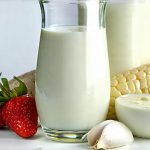Lactose intolerance affects a significant portion of the global population, causing digestive discomfort after consuming dairy products or foods containing lactose. This occurs due to insufficient levels of lactase, the enzyme needed to break down lactose – a sugar found in milk and other dairy items – into simpler sugars for absorption. The undigested lactose then ferments in the colon, leading to symptoms like bloating, gas, diarrhea, and abdominal pain. While managing lactose intolerance typically involves dietary adjustments, emerging research explores the potential benefits of probiotics as an adjunct approach to symptom management.
Many individuals with lactose intolerance unnecessarily restrict dairy from their diets, potentially missing out on essential nutrients like calcium and vitamin D. Understanding the nuances of lactose intolerance – its varying degrees of severity and individual tolerance levels – is crucial for effective management. Probiotics, live microorganisms that confer health benefits when consumed in adequate amounts, are garnering attention as a possible way to improve lactose digestion and reduce associated symptoms. This article explores the science behind using probiotics to manage lactose intolerance, examining how they work, which strains show promise, and what considerations individuals should keep in mind.
Understanding Lactose Intolerance & Probiotics
Lactose intolerance isn’t typically an allergy but a digestive issue stemming from lactase deficiency. The severity can range dramatically; some experience significant discomfort with even small amounts of lactose, while others tolerate moderate quantities without problems. This variation is partially genetic and can also change over time.
Probiotics are increasingly recognized for their role in gut health beyond just digestion. They contribute to a healthy microbiome – the complex community of microorganisms residing in our digestive tract – which impacts immunity, nutrient absorption, and overall well-being. Certain probiotic strains may help address lactose intolerance by influencing lactase activity or improving gut barrier function.
Probiotic Mechanisms & Lactose Digestion
The potential mechanisms through which probiotics can aid in managing lactose intolerance are multifaceted. Primarily, some strains possess inherent β-galactosidase activity – the enzyme that breaks down lactose. By introducing these bacteria into the gut, they can directly assist in lactose digestion, reducing the amount reaching the colon and lessening fermentation. Additionally, probiotics can improve intestinal motility, potentially speeding up the passage of undigested lactose through the digestive system. Furthermore, a healthier microbiome fostered by probiotic consumption may enhance overall digestive efficiency and reduce inflammation, leading to improved symptom management.
Promising Probiotic Strains for Lactose Intolerance
Several Bifidobacterium and Lactobacillus strains have demonstrated encouraging results in studies related to lactose intolerance. Bifidobacterium infantis, Bifidobacterium lactis, Lactobacillus acidophilus, and Lactobacillus rhamnosus GG are among those frequently investigated. These strains appear to vary in their β-galactosidase activity and ability to reduce symptom severity. However, it’s important to note that research findings aren’t always consistent; some studies show significant benefits while others report more modest effects. The specific strain, dosage, and individual gut microbiome all influence the outcome.
It is crucial to remember that not all probiotic supplements are created equal. Product quality can vary significantly, and ensuring a sufficient concentration of viable bacteria (colony forming units or CFUs) is essential for efficacy. Look for products from reputable manufacturers that guarantee CFU counts and have undergone third-party testing.
Dietary Considerations & Probiotic Synergy
Probiotics aren’t a standalone solution; they are most effective when integrated into a broader strategy for managing lactose intolerance. This includes understanding your individual tolerance levels and making informed dietary choices. Many individuals can tolerate small amounts of lactose, or lactose present in fermented dairy products like yogurt (where bacterial cultures have partially broken down the lactose).
Combining probiotic supplementation with a diet that minimizes excessive lactose intake – while still allowing for some potentially tolerable quantities – may yield optimal results. Probiotics also work synergistically with prebiotics – non-digestible fibers that feed beneficial gut bacteria. Incorporating prebiotic-rich foods (like bananas, onions, and garlic) or supplements can further enhance the effectiveness of probiotics.
Considerations & Future Research
While promising, it’s essential to approach probiotic use cautiously. Individuals should consult with a healthcare professional before starting any new supplement regimen, particularly if they have underlying health conditions or are immunocompromised. Probiotics aren’t universally effective and may not provide significant relief for everyone with lactose intolerance. Furthermore, the long-term effects of probiotic supplementation are still being investigated.
Future research should focus on identifying specific probiotic strains that consistently demonstrate efficacy in reducing lactose intolerance symptoms, determining optimal dosages, and understanding how to personalize probiotic interventions based on an individual’s microbiome profile. Exploring the interplay between probiotics, diet, and gut health is crucial for developing more targeted and effective strategies for managing this common digestive condition.


















